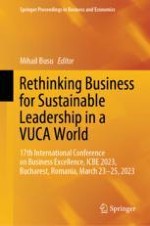This book presents a selection of the best papers from the 17th International Conference on Business Excellence, “Rethinking Business: Sustainable Leadership in a VUCA World” (ICBE 2023), held in Bucharest, Romania, in March 2023.
In today's rapidly evolving landscape, characterized by volatility, uncertainty, complexity, and ambiguity (VUCA), the need to reshape business practices has become paramount. The book showcases research findings and perspectives on the new challenges particularly posed by the digital economy and research systems. Focusing on revolving business and developing sustainable leadership, it offers valuable insights into the present context of global crisis, together with solutions for the real-world challenges we face today.
